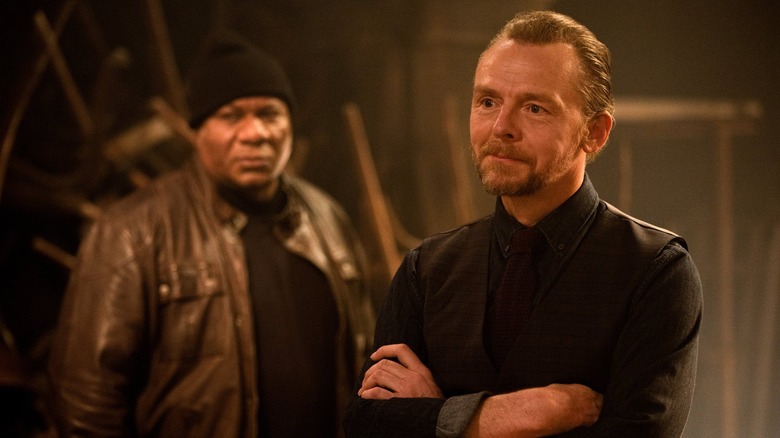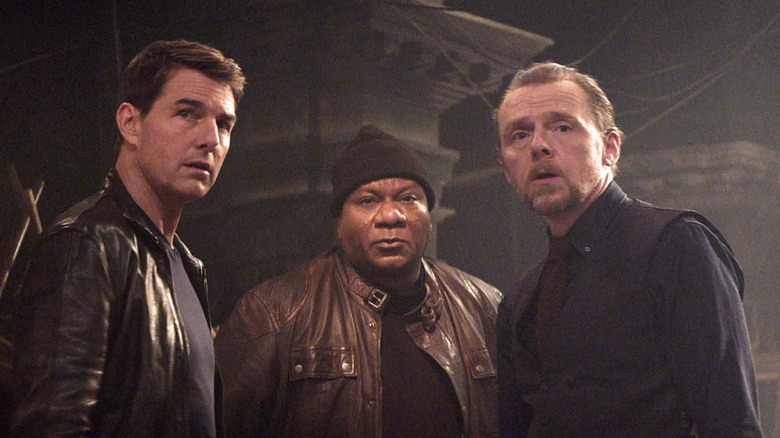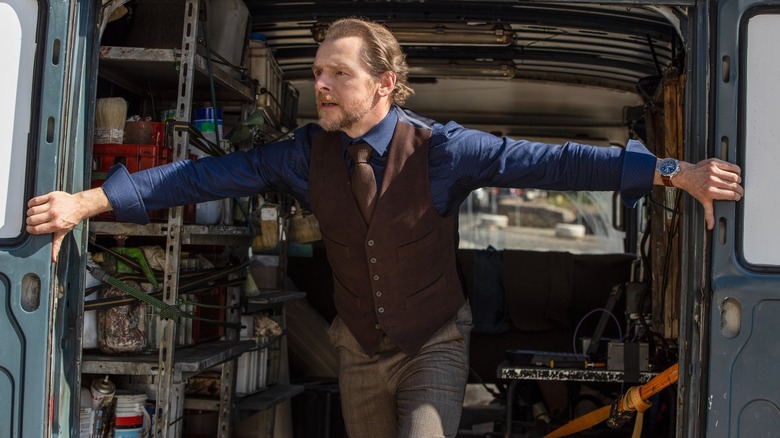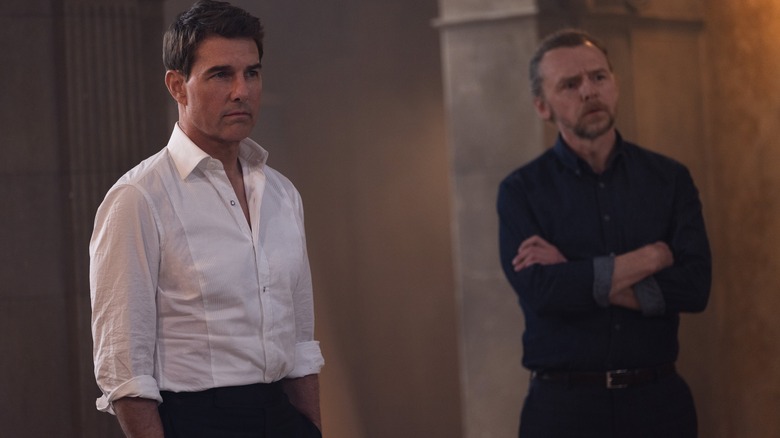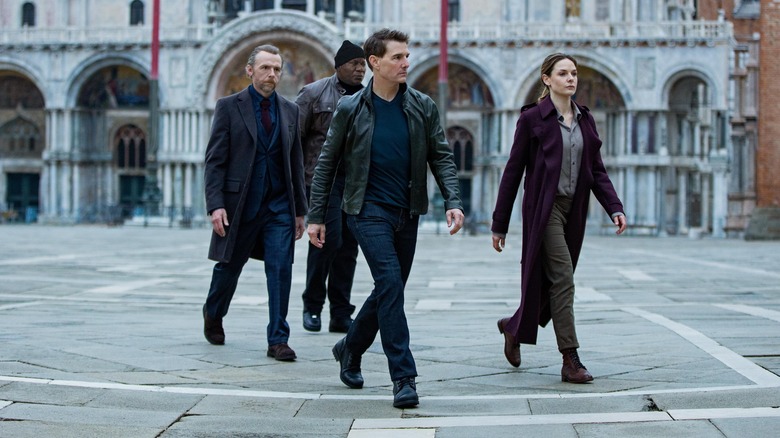Mission: Impossible – Dead Reckoning's Simon Pegg On Benji's Arc And Deleted Scenes [Exclusive Interview]
This interview contains spoilers for "Mission: Impossible — Dead Reckoning Part 1."
Simon Pegg has been around the block for a little while, as he graciously and good-naturedly acknowledges when he's informed by an irritating interviewer like me (far from the first time during this press tour, assuredly) that he's portrayed tech guru Benjamin Dunn in the "Mission: Impossible" movies for over a decade and a half at this point. First cast in J.J. Abrams' "Mission: Impossible III" — in a role that Twitter has recently rediscovered was originally offered to Ricky Gervais, incredibly enough — Pegg has enjoyed a front-row seat to Benji graduating from his "schlubby" desk job to becoming a field agent to getting multiple hero moments of his own. This culminated with Benji finally getting to put on a mask in 2018's "Fallout" and playing an instrumental role in unveiling Henry Cavill's August Walker as the real villain of the previous movie. Thankfully, that upwards trend certainly continues with the upcoming "Dead Reckoning Part 1."
I was lucky enough to chat with the "Star Trek" and Cornetto Trilogy actor over Zoom recently, where I proceeded to pick his brain on his journey to this point in the "Mission" franchise. Everything was on the table, from forging a creative collaboration with director Christopher McQuarrie and co-star Tom Cruise, to his thoughts on why Benji's become such a fan-favorite character, to a little discussion on a spoilery moment or two from "Dead Reckoning" that meant recording certain crucial lines of dialogue remotely, entirely over the phone.
Note: This interview has been lightly edited for clarity and brevity.
'It's a real privilege to be able to evolve a character over the years'
I'm going to do that annoying interviewer thing of reminding you just how long you've been doing this role. It's been 17 years since you first joined the "Mission: Impossible" franchise. Obviously nobody embodies a character quite like Tom Cruise does with Ethan Hunt, but what level of ownership do you feel over Benji Dunn? These movies always have so much going on, so how protective are you of him in making sure he's present and accounted for and gets his moments to shine along with the rest of the cast?
Benji's the character I've played the most in my entire career for the longest time, and I feel extremely close to him. Fortunately, for the most part of my time as Benji, I've been working with Christopher McQuarrie, because he came on board when we did "Ghost Protocol," and then every subsequent film he's directed. So I know McQ understands Benji, and I always know that whatever he lays out for me, I'm going to like it. We work on him together. I try and bring as much of myself to him as I can, but it's a real privilege to be able to evolve a character over the years, and whenever we start a new film, it's like, "Okay, what did Benji go through this time? What did he go through last time? And how can I build on that?" So yeah, I totally feel like I'm part of the creative process when it comes to Benji.
Looking back at "Mission: Impossible III," I can't imagine you ever thought that you'd end up with a more physical, more action-heavy role when you first started. Did you ever feel that progression throughout each movie, or did it kind of sneak up on you?
Yeah, well, I mean, I look back on "Mission: Impossible III" and I always joked with Tom and say that I just look like a potato. I just was kind of a bit schlubby and I wasn't really taking care of myself. And then when we came to do "Ghost Protocol" and the idea came about that Benji be a field agent, it was like, "Okay, now you've got to get yourself in shape. You've got to look like a field agent." So that was when I really started my personal fitness journey, which I've done ever since. So in that respect, the film series has really changed my life.
'I think that's what appeals to the audience about him'
If you could go back in time to your younger self, would you be a little more hesitant about joining the role if you knew that it would be this demanding of you, or do you feel like this is exactly –
Oh, I had no idea that I would come back for another one, let alone be in five, now six. I would just be like, "Buckle up, sunshine. You're going to have a great time. You're going to have an amazing 17 years." I get to be in these movies. I get to call Tom my friend and meet such amazing people and get to go to all these incredible places and learn new skills. It's kind of a dream job.
You should know that at both "Dead Reckoning" screenings that I've attended, there's this one line you say early on when Benji's asked about the thing he cares about most in the world, and you say, "My friends," with that just perfect delivery of embarrassment and self-consciousness, but also just so much earnestness, too. That's elicited audible "Awwww"'s out of the audience both times. I feel like that speaks to how much of a fan-favorite Benji's become over the years. Did you ever envision that happening even for a moment in the years since you were first cast?
[Laughs] That's great. I think the thing about Benji is that he's kind of one with the audience. He's the one member of the IMF team who will draw attention to the absurdity and the danger. Ethan can't afford to do that. Ethan just has to keep going. Luther (Ving Rhames) is such a kind of journeyed professional that he just takes it all in his stride. But Benji's the one that's like, "What the f***?" [Laughs] And I think that's what appeals to the audience about him, is that he's relatable in that degree. It's very smart to have a character like that, that gives people a way into this insane world where it isn't just a bunch of superheroes taking everything on the chin. It's like, no, this is real stakes and real life. And the fact that Benji cares so much about them as well just makes him very human, I think.
'It's like a f***ing horror movie at that moment'
I counted maybe three or four instances where you have to deliver these big exposition dumps in the middle of the action in "Dead Reckoning." A lot of people consider exposition to be a necessary evil, but I feel like it takes a certain amount of skill for an actor to deliver that. How exactly do you approach that and make it sound so natural, too?
Well, I mean, as a writer, exposition is my least favorite thing to do. You have to make it part of the story, it can't feel like entirely just information. I joke with McQ all the time about it, about Benji being the narrator of the story sometimes. But you just have to invest it with complete commitment. You can't be wry and draw attention to the fact that you are basically explaining something to the audience. You have to make it part of the story. And what's great about Benji is that, because he's constantly reevaluating the situation he's in, because he's constantly reflecting on where he is and what he's doing, it's very, very like him to have to say, "Wait a minute, so we're doing this, this, this, this, and this?" And it feels much more character-driven than just sort of lazy delivery of information.
One spoilery question I do have to ask you: There's a moment when Benji is guiding Ethan along, telling him directions like he's done a million times before, and their communications get hacked by the Entity, and that gives you the opportunity to be a spokesperson for the villain of the movie.
Yeah.
What kind of direction did you get from Chris about exactly how to deliver those lines, whether to go over-the-top and theatrical, or robotic and a little soft-spoken the way you do?
That's a brilliant question actually, because that's totally what we played with. And a lot of the stuff that we use in the film, I did on my phone. We were talking about it, I was at home, McQ was in the edit, and he's saying, "Oh, we want to get this." And so we started delivering the lines. I went to the edit and did some more ADR. But I think, in the end, we used what I did on my phone because it felt like the best pitched version of it. Because you're right, it could have gone like HAL in "2001" or it could have gone a little bit silly. But the idea was, it's just this thing recorded Benji's voice when he was talking to the bomb and can now just become him. And the fact that the Entity possesses one of Ethan's most trusted friends, it's like a f***ing horror movie at that moment. It just chills me to the bone every time I watch it. And you just hear it making Ilsa (Rebecca Ferguson) go to the bridge. It's giving me goosebumps talking about it.
'It's a testament to what a good filmmaker Chris is'
There's another moment within that same sequence where once Benji realizes what's happening, you jump in a speedboat and you say, "I'm going to go find Ethan." And then it sort of cuts to the end of the scene where you just arrive in the aftermath. I have to imagine there was some sort of action sequence that was in the middle of there, maybe cut for pacing or something. Is that what happened?
[Laughs] That is true. I did quite a bit of driving around, looking for Ethan and trying to bring him up on the comms, but when it came to the pace of the moment, it didn't feel quite as necessary. Benji's mission in that moment didn't feel as important as what was — we knew Benji was on his way to find Ethan and we knew he was out there. Seeing Benji arrive at the end just closes that little arc. The fact is, what was happening on screen in what we were cross-cutting with was so huge, it almost felt like it was detracting from it to cut away.
Obviously, these movies are made a mile a minute. Chris has described the process before as jumping onto a moving train. Has there been some sequence, storyline, or plot point in years past or within "Dead Reckoning" itself that was left on the cutting room floor, that you found to be your personal favorite and wish that could have made it in?
Yeah, I mean, that always happens and it's a testament to what a good filmmaker Chris is, that he's prepared to — we always call it killing our babies, when there are bits that you love that were fantastic in the moment, but for the sake of pacing, for the sake of time, you have to make tough decisions. We shot a whole sequence in "Fallout" when we arrive at this checkpoint before we get to Kashmir. And we were up there all day, it was snowing, it looked amazing, and in the end, it just slowed the story down. So we cut it out.
Oh, actually there's a bit in the motorcycle chase. It's in the trailer, but it's not in the movie, when Ethan says, "Oh, we better go to plan B." And Benji says, "Great, what's that?" [Laughs] But that's not in the movie. But I never regret that stuff because I know it's for the greater good. You've got to make the film sing. And for Tom and McQ, I asked them when we were shooting, I said, "How long is the film going to be?" And they both said, "As long as it's entertaining." And I just thought, "Well, that's the perfect answer." I've seen 86-minute movies that felt longer than "Mission: Impossible."
Do you find that process for these movies stressful at all? Sometimes there are scenes that may not be fully finalized in the script until the day before shooting. Do you find that stressful as an actor?
It is, but in some respects it adds to the dynamic of making the movie. We always like to have a "Mission: Impossible" running alongside our "Mission: Impossible" and sometimes — the best example of that is we were shooting the scene in "Fallout" when Rebecca and I are trying to diffuse the nuclear bomb. I've just been hung and she's revived me. And we get up and it was five minutes to midnight, and we knew that if we went over into overtime, it would cost the production a bit of money. So we had to finish the scene on time, and we hadn't — we got the lines for that scene like that morning, and it was just so, so stressful. But it reads on the screen, you can feel the tension. So that's a little technique McQ likes to employ.
"Mission: Impossible — Dead Reckoning Part One" is in theaters now.
